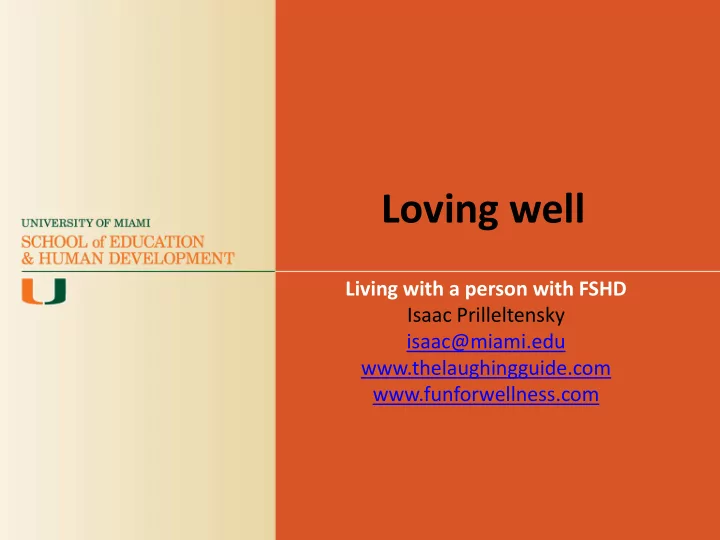

Loving well Living with a person with FSHD Isaac Prilleltensky isaac@miami.edu www.thelaughingguide.com www.funforwellness.com
Well-Being Experiences of pleasure and purpose, over time, in “i coppe ” domains of life
Domains of Well-Being • I NTEPERSONAL • C OMMUNITY • O CCUPATIONAL • P HYSICAL • P SYCHOLOGICAL • E CONOMIC
Well-Being PLEASURE PURPOSE • Mattering • Joy – feeling • Humor valued – adding value
Feeling Valued Mattering Adding Value 11/14/2016 9
Threats to Feeling Valued Invisible Feeling Valued Entitled Mattering Adding Value 11/14/2016 10
Threats to Adding Value Feeling Valued Mattering Helpless Adding Value Autocrat 11/14/2016 11
Mattering in Loving Well • How do you experience mattering in living with a person with FSH? • How do you feel valued? • How do you add value?
Challenges in Loving Well • What challenges do you experience in living with a person with FSH? • What prevents you from feeling valued? • What prevents you from feeling that you are adding value?
Reciprocity • Reciprocity is important in all relationships • Rigid roles as caregiver or care receiver can lead to stigma and stereotypes • Both parties entitled to express and fulfill basic human needs
Dignity • Dignity is one of the highest human values • Pity does not foster dignity • We gain dignity not just by feeling valued, but also by opportunities to add value • Person with FSH, like the rest of us, is seeking to add value, not just to be in “recipient” role
Creativity • There is only one family in the world with the particular context of your life. • You know your family situation best. • Embracing rigid social norms of what it means to be happy can limit your fulfillment in life • How can you turn this situation into a unique opportunity for you to make meaning in life?
Competency • Understanding a situation is important, but knowing how to deal with it is even more useful • We need to develop and share skills related to the experience of “mattering” • What skills can we learn to “love well” when we live with a person with FSH?
Competency = Skills in drivers of change • BEHAVIORS • EMOTIONS • THOUGHTS • INTERACTIONS • CONTEXT • AWARENESS • NEXT STEPS
Domains of Well-Being • I NTEPERSONAL • C OMMUNITY • O CCUPATIONAL • P HYSICAL • P SYCHOLOGICAL • E CONOMIC
BET I CAN: Seven scientific principles to promote well-being Behaviors Next Emotions Steps Well Being Thoughts Awareness Context Interactions 20
BET I CAN STRATEGIES SET A GOAL Behaviors CREATE POSITIVE HABITS Next Emotions Steps Well- Being Thoughts Awareness Context Interactions 21
BET I CAN COPE WITH NEGATIVE EMOTIONS Behaviors COLLECT POSITIVE EMOTIONS Next Emotions Steps Well- Being Thoughts Awareness Context Interpersonal 22
BET I CAN Behaviors Next Emotions Steps CHALLENGE ASSUMPTIONS WRITE A NEW STORY Well- Being Thoughts Awareness Context Interactions 23
BET I CAN Behaviors Next Emotions Steps Well- Being Thoughts Awareness CONNECT COMMUNICATE Context Interactions 24
BET I CAN Behaviors Next Emotions Steps Well- Being READ THE CUES Thoughts Awareness CHANGE THE CUES Context Interactions 25
BET I CAN Behaviors KNOW Next Emotions YOURSELF Steps KNOW THE ISSUE Well- Being Thoughts Awareness Context Interactions 26
BET I CAN Behaviors Next Emotions MAKE A PLAN Steps MAKE IT STICK Well- Being Thoughts Awareness Context Interactions 27
28
Videos Interpersonal Physical Psychological Economic Occupational Community Psychological Physical Interpersonal 29
Mini-Games Teach Wellness 30
How can you use BET I CAN? • What skills can you use in your situation? • Select one and apply it to your life. • Share with the person next to you. • Consider sharing with the rest of the group. 31
Recommend
More recommend